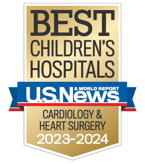Electrophysiology Program
Nationally ranked by U.S. News & World Report

The electrophysiology team cares for children with all types of heart rhythm disorders.
Our team consists of experienced pediatric electrophysiologists trained to identify and correct abnormal pathways in the electrical system of the heart. Other team members include electrophysiology nurses, advanced practice providers and specialized technicians.
The electrophysiology team is available 24 hours a day, seven days a week for children who are experiencing heart rhythm issues. We use the latest technology and treatment methods to give every child the best possible outcome.
What to Expect - Electrophysiology Study
The Electrophysiology (EP) team can examine your child’s heart to identify—and in some cases, treat—abnormal pathways in the electrical system of the heart. EP studies are done under anesthesia and attended by pediatric anesthesiologists to ensure your child is safe and comfortable the whole time.
Nationally ranked by U.S. News & World Report
Nationally ranked by U.S. News & World Report
-
Comprehensive history and physical exam
-
Consultation for various rhythm disorders
-
ECG recording services 12-lead electrocardiography
-
Event recorders for unpredictable events
-
24-hour ambulatory Holter monitoring
-
Implantable loop recorders
-
Invasive electrophysiologic testing
-
Transesophageal electrophysiologic (EP) study
-
Intracardiac comprehensive EP study
-
Catheter based treatment of supraventricular or ventricular tachycardia
-
Radio frequency current and cryoablation
-
3-D electroanatomic mapping for all invasive cases to reduce radiation exposure and improve accuracy for ablation procedures
-
Pacemakers (transvenous or epicardial)
-
Defibrillators (transvenous or epicardial)
-
Genetic testing and consultations for patients with inherited arrhythmia syndromes
Conditions
-
Supraventricular and ventricular tachycardia
-
Congenital or acquired heart block or sinus node dysfunction
-
Arrhythmia syndromes
-
Unexplained syncope and cardiac arrest
